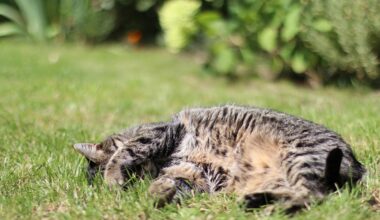Renewing Cat Registrations for Senior and Special Needs Cats
Every cat, especially senior and special needs cats, deserves proper registration renewal to ensure legal protection. This process varies widely due to specific requirements set by local jurisdictions. Commonly, owners seeking to renew registrations must provide updated health documentation, proof of spaying or neutering, and any supporting medical records for their special needs cats. Additionally, many municipalities require proof of current vaccinations. Owners should maintain detailed records showing their cats’ health status and any medical treatments to streamline the renewal process. It’s also wise to check the registration timeline with local authorities. Setting reminders can help avoid late renewals, ensuring all documentation is up to date. Notably, some areas offer discounts or special considerations for senior cats, which may benefit low-income owners. Owners may also find that local veterinarians can offer assistance. Networking with local pet advocacy groups may provide helpful insights, tips, and resources. Cat guardians should not hesitate to reach out proactively to local authorities for clarifications about any changes to registration laws that might affect them.
Understanding Local Laws and Requirements
Understanding the specific laws and requirements in your area regarding cat registration is crucial. Each jurisdiction establishes its rules, impacting the process of renewing registrations for senior and special needs cats. Owners must consult their local animal control department’s website or call directly for up-to-date information. Some areas may enforce stricter rules, while others may provide leniency concerning older cats. Familiarizing yourself with local laws will help prevent unnecessary penalties or fines. Regulations can include deadlines for registration renewal as well as fees that must be assessed based on the cat’s age or health condition. Furthermore, the procedure may necessitate personal identification for the owner alongside the cat’s adoption paperwork. As cats grow older, special needs may arise, and ensuring their registration reflects accurate information is essential. Providing evidence of special needs status might even lead to beneficial exemptions. The landscape of cat registration is ever-changing, making it vital for cat owners to stay informed about legal obligations while considering their pets’ unique requirements. This will ultimately support a healthier and happier life for the cats.
As part of registration, many municipalities also mandate specific microchipping requirements for cats. This requirement aims to ensure pets can be easily identified if lost or found. For senior or special needs cats, having a microchip is even more critical, as it is a safeguard against future predators or theft. Owners should prioritize achieving proper microchip registration to meet renewal standards. Using a reliable microchipping service is also essential. Ensure all information is kept up to date in the microchip database anytime you move or change contact information. Not only does this fulfill legal obligations, but it creates peace of mind. Additionally, some jurisdictions might offer alternative identification methods for feline friends with unique needs. When exploring registration renewal, don’t overlook the possibility of appealing to local animal shelters for categories or programs tailored for special needs cats. Many animal shelters encourage adoption and will also help identify suitable programs. This collaborative approach can provide more effective outcomes for senior and special needs cats seeking longevity in their registration status.
Benefits of Proper Registration
Properly renewing cat registrations also yields several benefits beyond legal compliance. For senior and special needs cats, this includes access to various resources and programs designed for their welfare. Registered cats often qualify for reduced veterinary care costs, and their owners may receive discounts on medications or treatments. Additionally, proof of registration can provide access to specialized cat care programs offered by organizations dedicated to aiding seniors and special-needs pets. Registered owners might also gain eligibility for community resources available to assist pets in need, creating a comprehensive support system. Furthermore, registered cats are less likely to face issues with local animal control, reducing the possibility of fines or even the risk of having them considered stray animals. Engaging with these benefits promotes responsible pet ownership while ensuring that cats receive all necessary care and attention. Therefore, owners must be proactive in understanding both the requirements and benefits your local registration might provide, benefitting both cats and their human companions. This attention to detail not only enhances your pet’s quality of life but makes a significant difference in their overall well-being.
Renewing cat registrations can become quite daunting, especially for those who struggle to keep track of documentation, especially for senior and special needs cats. However, being organized significantly eases this process. Owners should create a file containing essential documents such as veterinary records, registration forms, and microchip information. Additionally, utilizing digital tools like electronic calendars can help monitor deadlines related to registration renewal. Setting alerts days or weeks in advance ensures that important dates are not overlooked or forgotten, ultimately maintaining a cat’s good standing with local regulations. Furthermore, it would be prudent to develop a checklist outlining all required documentation for renewal, ensuring nothing is missing on the day of submission. Moreover, personal organization can also alleviate stress. Cat owners juggling professional responsibilities alongside personal duties must incorporate renewal tasks into their routine. Sharing the responsibility among family members can also reduce the burden. Contacting local authorities to clarify what documentation is specifically needed may prove valuable, reinforcing preparedness throughout the renewal process while supporting senior and special needs cats in the long term.
Owner Support Resources
Pet owners searching for support resources focusing on cat registration can find numerous organizations aiming to aid them in the process. Many animal advocacy groups offer workshops and informational sessions focused on registration, regulations, and the specific needs of senior and special needs cats. These sessions can present opportunities for networking amongst like-minded individuals. Online forums or community pages cultivated by cat owners provide platforms for users to share experiences and tips, fostering camaraderie and support. Additionally, platforms such as social media can connect pet owners with resources, allowing them to ask questions of professionals. Local veterinarians often provide comprehensive guidance regarding these issues, standing as an invaluable source for advice. During routine veterinary visits, inquire about any updates to regulations or programs that may be helpful. Furthermore, the internet offers rich resources including PDFs, articles, and guides that can serve as excellent reference materials. Awareness of these resources can empower owners to navigate the registration renewal process effectively. This ultimately leads to better outcomes for their beloved feline companions, ensuring their well-being and security.
In conclusion, renewing registrations for senior and special needs cats is essential, legally and ethically. Owners should prioritize understanding local regulations and promoting penny pinching as a valuable aspect of pet ownership. Maintaining awareness of specific provisions available to older cats can facilitate a smoother renewal process. Regular updates and documents should be easily accessed and well organized as part of responsible ownership. Support from community organizations and networking makes a significant difference in navigating registration renewal issues. Connecting with fellow cat guardians through forums, social media, or local events furthers collaboration, creating a unified front in addressing challenges. Moreover, pet owners must consider proactive measures that can enhance their cats’ quality of life and ensure their registration remains compliant with local laws. Each step taken in renewal embodies serious commitment to the well-being of these cherished companions, particularly for those whose needs may be special, requiring even greater diligence. Ultimately, responsible renewal processes contribute to a more harmonious relationship between cat guardianship and local regulations while ensuring senior and special needs cats receive the benefits they need.


